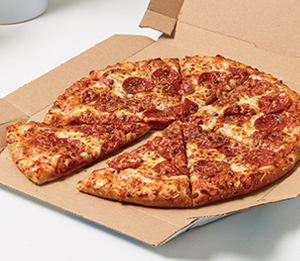This is a node.js API for integrating with the Domino's pizza APIs. See the pretty Domino's Pizza API documentation
npm dominos info : See npm trends and stats for dominos




This work is licenced via the MIT Licence. It is a derivative work from Dominos API.
Install the Dominos pizza api
npm i dominos
- Pull or Fork code.
- From the cloned directory run
npm i(this will install required dependancies, depending on your system may require) - Be awesome!
See the examples directory for simple apps and demonstrations on using the basic functionality.
For testing we have started using the extremely light vanilla-test testing suite. It is a pretty bare bones testing framework, but it works really well and simply with native ES6 and ESM. vanilla-test on npm
Simply run npm test
This will setup everything that is needed to run the tests, install the modules required and run the tests for you.
Remember, the Dominos API is rate limited, so if you make too many requests, like running tests back to back too many times, you may need to wait a short while before making new requests.
For coverage we are using the amazing c8 coverage suite. It produces awesom instanbul style reports as well as lcov and much mmore. It allows testing of pure ES6 code without transpiling, and does not modify the code at all for coverage. It uses the built in node coverage tools to test the execution directly inside v8 c8 on npm
Simply run npm test and the coverage files will be added to the ./coverage directory automatically. You can start a local coverage server to view your results by running npm run coverage. This will start a simple node-http-server for your local coverage directory.
import {Order,Customer,Item,Payment,NearbyStores} from '../index.js';
//extra cheese thin crust pizza
const pizza=new Item(
{
//16 inch hand tossed crust
code:'16SCREEN',
options:{
//sauce, whole pizza : normal
X: {'1/1' : '1'},
//cheese, whole pizza : double
C: {'1/1' : '2'},
//pepperoni, whole pizza : double
P: {'1/2' : '2'}
}
}
);
const customer = new Customer(
{
//this could be an Address instance if you wanted
address: '2 Portola Plaza, Monterey, Ca, 93940',
firstName: 'Brandon',
lastName: 'Miller',
//where's that 555 number from?
phone: '941-555-2368',
email: '[email protected]'
}
);
let storeID=0;
let distance=100;
//find the nearest store
const nearbyStores=await new NearbyStores(customer.address);
//inspect nearby stores
//console.log('\n\nNearby Stores\n\n')
//console.dir(nearbyStores,{depth:5});
//get closest delivery store
for(const store of nearbyStores.stores){
//inspect each store
//console.dir(store,{depth:3});
if(
//we check all of these because the API responses seem to say true for some
//and false for others, but it is only reliably ok for delivery if ALL are true
//this may become an additional method on the NearbyStores class.
store.IsOnlineCapable
&& store.IsDeliveryStore
&& store.IsOpen
&& store.ServiceIsOpen.Delivery
&& store.MinDistance<distance
){
distance=store.MinDistance;
storeID=store.StoreID;
//console.log(store)
}
}
if(storeID==0){
throw ReferenceError('No Open Stores');
}
//console.log(storeID,distance);
//create
const order=new Order(customer);
// console.log('\n\nInstance\n\n');
// console.dir(order,{depth:0});
order.storeID=storeID;
// add pizza
order.addItem(pizza);
//validate order
await order.validate();
// console.log('\n\nValidate\n\n');
//console.dir(order,{depth:3});
//price order
await order.price();
// console.log('\n\nPrice\n\n');
// console.dir(order,{depth:0});
//grab price from order and setup payment
const myCard=new Payment(
{
amount:order.amountsBreakdown.customer,
// dashes are not needed, they get filtered out
number:'4100-1234-2234-3234',
//slashes not needed, they get filtered out
expiration:'01/35',
securityCode:'867',
postalCode:'93940',
tipAmount:4
}
);
order.payments.push(myCard);
//place order
try{
//will throw a dominos error because
//we used a fake credit card
await order.place();
console.log('\n\nPlaced Order\n\n');
console.dir(order,{depth:3});
}catch(err){
console.trace(err);
//inspect Order Response to see more information about the
//failure, unless you added a real card, then you can inspect
//the order itself
console.log('\n\nFailed Order Probably Bad Card, here is order.priceResponse the raw response from Dominos\n\n');
console.dir(
order.placeResponse,
{depth:5}
);
}
The module now supports using multiple sets of endpoints that we have in ./utils/urls.js or even custom endpoints. However, if you get hyour country working with custom endpoints, PLEASE CONTRIBUTE THEM BACK! You will get credit as soon as your endpoints are merged back in.
See detailed information on how to use the international endpoints or custom endpoints here : International Dominos Endpoints and how to use them
USA is default so you really dont need to do anything other than import {urls} from 'dominos'; if you want access to the usa endpoints.
import {urls} from 'dominos';
console.dir(urls);
//Or to reset the usa if you switched to custom or another country
import {urls} from 'dominos';
import {useInternational,canada,usa} from 'dominos/utils/urls.js';
//first set to canada so we can see it work since USA is default
useInternational(canada);
console.dir(urls);
//then set it back to usa so we can confirm it works
useInternational(usa);
console.dir(urls);
import {urls} from 'dominos';
import {useInternational,canada} from 'dominos/utils/urls.js';
useInternational(canada);
console.dir(urls); import {urls} from 'dominos';
import {useInternational,canada} from 'dominos/utils/urls.js';
const myCountriesURLs={
referer :"https://order.dominos.nz/en/pages/order/",
sourceUri :"order.dominos.nz",
location:{
find:urls.location.find
},
store : {
find : "https://order.dominos.nz/power/store-locator?s=${line1}&c=${line2}&type=${type}",
info : "https://order.dominos.nz/power/store/${storeID}/profile",
menu : "https://order.dominos.nz/power/store/${storeID}/menu?lang=${lang}&structured=true"
},
order : {
validate: "https://order.dominos.nz/power/validate-order",
price : "https://order.dominos.nz/power/price-order",
place : "https://order.dominos.nz/power/place-order"
},
track : "https://order.dominos.nz/orderstorage/GetTrackerData?"
}
useInternational(myCountriesURLs);
console.log('MY COUSTOM FAKE NZ ENDPOINTS');
console.dir(urls);See the detailed docs on addresses here : Address.md
import {Address} from 'dominos';
//full address examples
const address = new Address(
{
street:'900 Clark Ave',
city:'St. Louis',
region:'MO',
postalCode:'63102'
}
);
const address=new Address('900 Clark Ave, St. Louis, MO, 63102');
//partial address examples
const address = new Address(
{
street:'900 Clark Ave',
city:'St. Louis',
postalCode:'63102'
}
);
const address=new Address('900 Clark Ave, St. Louis, 63102');
//street and zip only examples
const fullAddressObject = new Address(
{
street:'900 Clark Ave',
postalCode:'63102'
}
);
const address=new Address('900 Clark Ave, 63102');
//zip only examples
const fullAddressObject = new Address(
{
postalCode:'63102'
}
);
const onlyZip = new Address('63102');This provides a list of basic info on stores that are nearby an address.
See the detailed docs on finding nearby stores here : NearbyStores.md
import {NearbyStores, Store} from 'dominos';
const nearbyStores=await new NearbyStores('88 Colin P Kelly Jr St, 94107');
console.dir(nearbyStores,{depth:1});
console.log('\n\nFirst nearby store');
console.dir(nearbyStores.stores[0],{depth:1});
//initialize the frst of the nearbyStores.stores
const store=await new Store(nearbyStores.stores[0].StoreID);
console.log('\n\nFull Store info called from the first nearby stores ID');
console.dir(store,{depth:1});This provides a detailed menu for a given store.
See the detailed docs on menus here : Menu.md
import {Menu} from 'dominos';
const menu=await new Menu(4337);
console.dir(menu,{depth:1});This provides detailed store information.
See the detailed docs on stores here : Store.md
import {Store} from 'dominos';
const store=await new Store(4337);
console.dir(store,{depth:1});Items are used to place orders.
See the detailed docs on items here : Item.md
import {Item} from 'dominos';
const pepperoniPizza=new Item(
{
code:'P_14SCREEN'
}
)
console.dir(pepperoniPizza);This creates a customer object for use when making an order.
See the detailed docs on customers here : Customer.md
import {Customer} from 'dominos';
const customer = new Customer(
{
address: '900 Clark Ave, 63102',
firstName: 'Barack',
lastName: 'Obama',
phone: '1-800-555-2368',
email: '[email protected]'
}
);
console.dir(customer);The Image class will grab the image for a product code and base 64 encode it. It extends the js-base64-file class.
See the detailed docs on image here : Image.md
import {Image} from 'dominos';
const productCode='S_PIZPX';
const savePath='./';
const pepperoniPizza=await new Image(productCode);
console.log(pepperoniPizza.base64Image);
//you could pass this to a user via sms, web socket, http, tcp, make an ascii art for the terminal, OR save it to disk or a database
//here we just save it to disk as an example.
//this is part of the js-base64-file class refrence, there is a link at the top of this file
pepperoniPizza.saveSync(pepperoniPizza.base64Image,savePath,productCode+'.jpg');
This class will initialize a creditcard payment object for an order.
See the detailed docs on payment here : Payment.md
import {Payment} from 'dominos';
const myCard=new Payment(
{
amount:10.77,
//dashes are not needed, they just make it easier to read
//the class sanitizes the data
number:'4444-4444-4444-4444',
expiration:'01/12',
securityCode:'867',
postalCode:'93940'
}
)
Finally... This class will order you pizza, and other things from the menu.
See the detailed docs on order here : Order.md
import {Order,Customer,Item,Payment} from 'dominos';
//extra cheese thin crust pizza
const pizza=new Item(
{
code:'14THIN',
options:{
//sauce, whole pizza : normal
X: {'1/1' : '1'},
//cheese, whole pizza : double
C: {'1/1' : '2'}
}
}
);
const customer = new Customer(
{
//this could be an Address instance if you wanted
address: '110 S Fairfax Ave, 90036',
firstName: 'Barack',
lastName: 'Obama',
//where's that 555 number from?
phone: '1-800-555-2368',
email: '[email protected]'
}
);
//create
const order=new Order(customer);
order.storeID=8244;
// add pizza
order.addItem(pizza);
//validate order
await order.validate();
//price order
await order.price();
//grab price from order and setup payment
const myCard=new Payment(
{
amount:order.amountsBreakdown.customer,
// dashes are not needed, they get filtered out
number:'4100-1234-2234-3234',
//slashes not needed, they get filtered out
expiration:'01/35',
securityCode:'867',
postalCode:'93940'
}
);
order.payments.push(myCard);
//place order
await order.place();
//inspect Order
console.dir(order,{depth:5});
//you probably want to add some tracking too...
This is how you track Pizzas! (and other things)
Rely on the order.place response. If the order fails, it will throw a DominosPlaceOrderError. Otherwise, your pizza is on the way. It also seems that orders placed via dominos module do not show up on the tracking website right now. These orders appear stealth at the moment.
See the detailed docs on tracking here : Tracking.md
import {Tracking} from 'dominos';
const tracking=new Tracking();
//track by phone
const trackingResult=await tracking.byPhone('3108675309');
console.dir(trackingResult,{depth:1});
//outputs
Tracking {
orders: {
//active trackable orders for this phonenumber
...
},
query: { Phone: '3108675309' },
dominosAPIResult: { 'soap:Envelope': [Object] }
}
// by order id
const trackingResult=await tracking.byID(storeID,order.iD);
console.dir(trackingResult,{depth:1});This class extends strong-type to allow strong and weak type checking of dominos specific types, errors and classes. It is used a lot in the dominos module to ensure correct types of arguments and errors. The strong-type module is really cool.
See the DominosTypes.md for more information.
import {IsDominos,Address} from 'dominos'
isDominos=new IsDominos;
let address='bob';
//address is a string so this will throw an Error
try{
isDominos.address(address);
}catch(err){
console.trace(err);
}
address=new Address('1 alvarado st, 93940');
//will not throw because this is an Address instance
isDominos.address(address);
These custom errors are added to the global object for use in your code and the dominos api. You can use them to validate errors or even throw your own if you are making a module ontop of this one.
See the detailed docs on DominosErrors here : DominosErrors.md
| error | parameters | description |
|---|---|---|
| DominosValidationError | .validationResponse |
this error is thrown when a dominos validation request fails |
| DominosPriceError | .priceResponse |
this error is thrown when a dominos price request fails |
| DominosPlaceOrderError | .placeOrderResponse |
this error is thrown when a dominos place request fails |
| DominosAddressError | message string | this error is thrown when an issue is detected with a dominos address |
| DominosDateError | message string | this error is thrown when an issue is detected with a date being used for a dominos order |
| DominosStoreError | message string | this error is thrown when an issue is detected with a store being used for a dominos order |
| DominosProductsError | message string | this error is thrown when an issue is detected with an orders product list |






